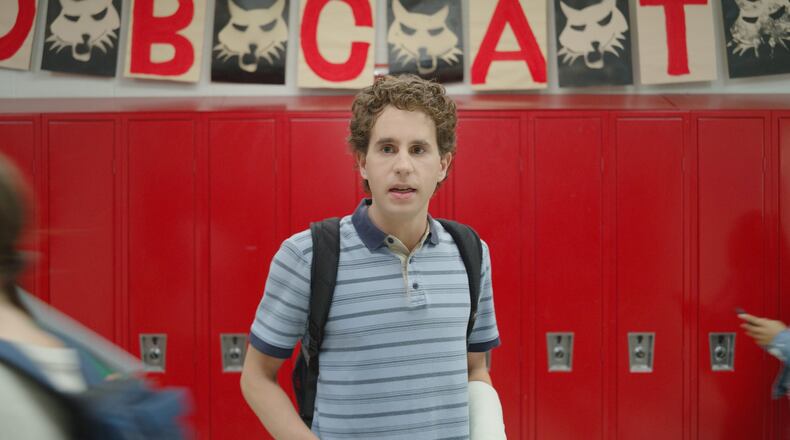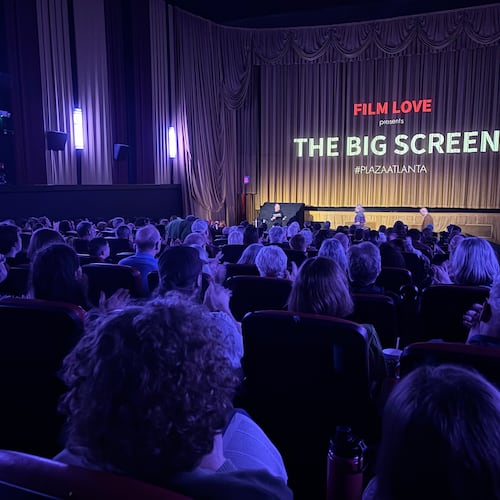The conversion of a Broadway musical into a feature film sometimes works (”Chicago,” “Grease”), sometimes doesn’t (”Cats,” “A Chorus Line”).
“Dear Evan Hansen,” out in theaters Friday, is hoping to be more the former, not the latter.
The musical was a big Tony-winning hit a few years ago on Broadway, focused on a teenager Evan Hansen (played by Ben Platt) with massive social anxiety whose note to himself is mistaken as a suicide note from a person he barely knew named Connor Murphy. Yet Connor’s family thinks they were close friends, a lie Evan rides to surprisingly popular heights before he finally confesses the truth.
It’s an emotional roller coaster packed with confessional, heartfelt songs such as “Waving Through the Window” and “Words Fail.”
The filmmakers faced several challenges, which director Stephen Chbosky acknowledged in an interview with The Atlanta Journal-Constitution. The musical on Broadway was relatively intimate and that feeling is magnified on the silver screen where tight close-ups and quieter moments are more the norm.
“Musicals are probably one of the most challenging genres there is,” said Chbosky. “It kind of either works or it doesn’t. There’s not a whole lot of nuance.” To make matters worse, “it’s not a traditional musical. It’s not performative. There is no cabaret. There is no backstage. There isn’t a reason to dance or sing or even fantasy like ‘Beauty and the Beast.’”
The singing often happens in the middle of seemingly normal conversations in living rooms and kitchens and bedrooms with no warning. And Chbosky wanted all the actors to actually sing on set, as opposed to lip-sync to tracks. “We wanted the authenticity of the place,” he said.
Another challenge was strict pandemic rules on set, which isolated everyone into pods and forced them to stay sequestered in hotels.
“We couldn’t really go out,” Chbosky said. ‘I really love the food in Atlanta but it was all brought to me. There were no bars. We didn’t see our families for four months.”
Some false positive COVID-19 tests a year ago made them even more paranoid and created hiccups in production.
For instance, they drove two hours north nearly to the Tennessee border to shoot a scene at an apple orchard. But a false positive COVID test shut them down. They had to go back two weeks later. “The relief you see on Ben Platt’s face and Kaitlyn Dever’s face is, ‘Thank God we don’t have to drive up this way again and have the plug pulled!’” Chbosky said. “It was like that every day. We didn’t know what was going to happen.”
On the bright side, when the actors took the masks off for scenes, he said, “it was such a relief and a magic alchemy. There was such a hunger to connect because we were so alone. And everyone was so grateful to work. Some people hadn’t worked for six months. And fortunately, nobody got sick on the set.”
Critics have seized upon the fact Ben Platt no longer looks like a high school student since he was 26 when he began shooting the movie and turns 28 Sept. 24. (Platt performed “Dear Evan Hansen” on Broadway when he was in his early 20s.) Adrian Horton of the Guardian said the makeup job on Hansen “renders him both older and inhuman ― an act of near-sabotage so distracting it basically renders the movie unrecoverable.”
The criticism chafes Chbosky. He notes that over the decades, films and TV shows have regularly cast actors in their 20s and even 30s to play teenagers even if they don’t always look it.
“A lot of the actors in the movie are basically his age. No one ever asks me about Nik Dodani [who plays Evan’s classmate, Jared, and is 27],” Chbosky told USA Today. “They only ask me about Ben. But the vast majority of people who’ve seen the movie are just so blown away by what (Platt) does that they don’t care and in my opinion, they shouldn’t.”
Platt himself had reservations about taking the role on again but decided it was worth it to enable a much wider audience to see “Dear Evan Hansen” and internalize the message that no matter how alone teens may feel, there are others who feel just like them.
“I felt a lot of internal pressure to deliver a performance that would have a similar impact on stage,” Platt said during a press conference call. “I relied on my instincts and my fellow ensemble members to make things more internal and more naturalistic, to give my performance a softer palate.”
Credit: Photo Credit: Universal Pictures
Credit: Photo Credit: Universal Pictures
The film amps up the star power, featuring Oscar-nominated actress Amy Adams as the sweet, grief-stricken mom of the dead teen and Oscar winner Julianne Moore as Hansen’s busy but loving mom.
Adams’ character Cynthia Murphy is so stricken with sadness and guilt, she latches onto Evan and makes him her surrogate son. Evan also falls for the daughter Zoe, played by Kaitlyn Dever.
“Nobody grieves the same way,” Adams said during a press conference. “It’s important to be patient with yourself and give others the space to explore those stages of grief.”
Evan isn’t always sympathetic but he is very human, Chbosky said. “You may not like what he does but we try to make it clear why he did it. He sees this family he is compelled to help and the lie spins out of control but his intent, at least at first, was not malicious. He could have kept lying but he didn’t. In the end of the day, he pays for it.”
Chbosky thinks the film’s message will resonate with young people who suffered mightily during the pandemic in terms of depression and isolation.
“I want this movie to be part of the solution,” he said. “Movies can have a really great effect. I want the most vulnerable kids to find it and get it. I really hope they feel seen and validated in terms of their experience.”
WHERE TO WATCH
“Dear Evan Hansen,” in area movie theaters Sept. 24
About the Author
Keep Reading
The Latest
Featured






